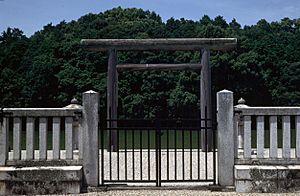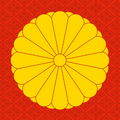Emperor Suinin facts for kids
Quick facts for kids Suinin |
|
|---|---|
| Emperor of Japan | |
| Reign | legendary |
| Predecessor | Sujin |
| Successor | Keikō |
| Born | legendary |
| Died | legendary |
| Burial | Sugawara no Fushimi no higashi no misasagi (Nara) |
Emperor Suinin (垂仁天皇, Suinin-tennō) was the 11th emperor of Japan. This is according to the traditional list of Japanese rulers. Historians believe Emperor Suinin was a legendary person. The name Suinin-tennō was given to him after his death by people who lived much later.
We do not have exact dates for Emperor Suinin's life or when he ruled. The names and order of the early emperors were officially set much later. This happened during the time of Emperor Kammu, who was the 50th ruler.
The Gukanshō, an old Japanese history book, says that Suinin ruled from a palace called Tamaki-no-miya. This palace was in a place known today as Yamato province.
Contents
Emperor Suinin: A Legendary Ruler
Emperor Suinin is almost certainly a legend. However, two very old Japanese books, the Kojiki and Nihonshoki, mention his name. They also record his family tree. He was the third son of Emperor Sujin.
Important Events During Suinin's Time
Even though we have little information, it does not mean such a person never existed. Most of what we know about early Japanese history comes from after the 29th emperor, Emperor Kimmei.
The Founding of Ise Shrine
One of Suinin's daughters was Yamatohime-no-mikoto. She created a special place for ceremonies to honor the Shinto sun goddess. The sun goddess is called Amaterasu Omikami. Yamatohime-no-mikoto founded the famous Ise Shrine in the Ise region. She became the first priestess, or Saiō, at Ise.
Early Shinto Ceremonies
Records from the Asama Shrine are found at the base of Mount Fuji. These records describe events from this time. The first Shinto ceremonies honoring Konohanasakuya-hime happened in the 3rd year of Emperor Suinin's rule.
The Start of Sumo Wrestling
The Nihonshoki also describes a wrestling match that took place during Emperor Suinin's era. This event is considered the beginning of Sumo wrestling in Japan.
After Emperor Suinin's Reign

The official name given to this emperor after his death is called a posthumous name. This name was made official many centuries after Suinin was believed to have lived.
The exact place where Emperor Suinin is buried is not known today. However, the Imperial Household Agency looks after a special memorial Shinto shrine. This shrine is called a misasagi. It is located in Nara and is where Emperor Suinin is honored.
Related pages
| Preceded by Emperor Sujin |
Legendary Emperor of Japan Suinin 29 BC - 70 AD (traditional dates) |
Succeeded by Emperor Keikō |
See also
 In Spanish: Suinin Tennō para niños
In Spanish: Suinin Tennō para niños
 | Aaron Henry |
 | T. R. M. Howard |
 | Jesse Jackson |


